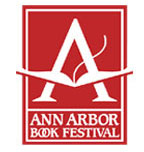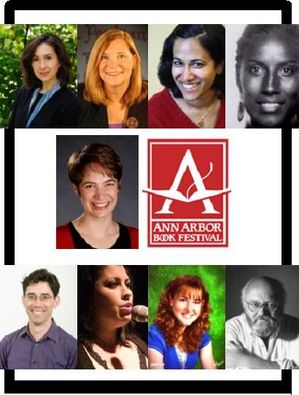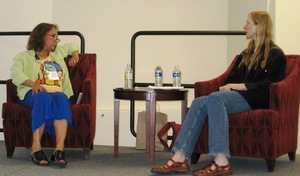Ann Arbor Book Festival offers writers opportunity to discuss craft; organizers look to the future

Perhaps you have heard that the Ann Arbor Book Festival is struggling to maintain its presence in our down-turned economy. Despite its scaled-back offering of events, the 2010 festival provided a great forum for aspiring writers and established authors to come together over a shared love for the craft.
My long and enjoyable day at the festival began by waking up bright and early to attend the Author Breakfast. I arrived promptly (so as not to miss a single moment) and took my seat at poetess Aracelis Girmay’s table. I quietly listened as she engaged in enthusiastic conversation with the director of the Literary Arts program at the Neutral Zone and fellow AnnArbor.com contributor, Jeff Kass. They spoke of the exciting turnout of Literama the night before and the volunteer work that each does to help give back to the community and spread their love for the written word. Feeling amazed and inspired, I couldn’t help but wonder what I could do to be more helpful in the community.
In turn, each author stood in front of the crowded sprawl of tables and was interviewed by mistress of ceremonies, radio personality Charity Nebbe. Participants became acquainted with:
V.V. (Sugi) Ganeshananthan, author of the novel “Love Marriage” and Zell Visiting Professor of Creative Writing to the University of Michigan. She shared her experiences working in journalism and explained how deadline-oriented reporting varies from the free-flowing process of creative writing, noting that the research training developed during her career as a journalist has proved to be most helpful when turning to the world of fiction.
Ann Pearlman, a local author of five wildly popular books, most recently penned “The Christmas Cookie Club”, which was her first novel. She admitted that she enjoys working on fiction because it’s fun to invent details within the story rather than frantically searching out every single detail within a nonfiction piece to make sure that it is accurate. Although she herself will not be penning the screenplay for her novel’s upcoming film adaptation, Pearlman expressed great excitement over finally getting to watch the movie and witness how her book has changed as a result of crossing over into this new medium.

The mistress of ceremonies and featured authors from the Book Festival's Author Breakfast. Visit this link for identification and further information.
Keith Taylor coordinates the undergraduate program in creative writing at the University of Michigan, in addition to creating beautiful works of poetry and fiction. His most recent work was “If the World Becomes So Bright”, a collection of poetry featured in Wayne State University’s Made in Michigan Writers series. When asked how he finds inspiration, he confessed that it just happens and there isn’t any surefire trick that one can use to induce it. He finds a great deal of inspiration in nature and particularly at the U of M Biological Station.
Rachel McKibbens has come onto the poetry scene with a big bang. Her pink-streaked hair and charismatic, melodic presence work together to demand your attention. I was drawn to her and immensely entertained, if poetry and stand-up comedy are ever to merge into a single, amusing art form, McKibbens will be its founder. Upon being discovered in her habit of tapping out syllables during speech (a crossover from the sing-song rhythm she likes to create in her poetry), she became embarrassed and ended her interview. Her first collection of poems is titled “Pink Elephant.”
Katie Mattie will knock your socks off. When the “Harry Potter” series came to its end in her sophomore year of high school, Mattie so sad she decided to write her own book. Six months later, the first draft of “MAJIC and the Oracle at Delphi” was completed. Since then, Mattie has picked up a literary agent and been asked to complete three more books as part of her series. Mattie is fascinated by Greek mythology and decided to marry the ancient folklore with elements of the modern world in her own fantasy series. Make sure to keep an eye out for this writing prodigy once her novel finally hits the stores!
Brenda Bentley knew that her book would only target a very small and select audience of readers but that didn’t stop her from writing her love letter to Ann Arbor “River Walks Ann Arbor.” This beautiful book of photos and maps is a walking guide through our favorite city. She has worked hard to systematically check and re-check every detail for accuracy, in order to provide the reader with the most thorough and accurate guide possible. Since this book has a specifically local interest, Bentley has decided to self-publish and do her own marketing; perhaps you will see her out and about presenting her excellent guide throughout the city.
Michael Byers can barely contain his excitement over his new novel “Percival’s Planet,” a fictional account of the discovery of Pluto. Though this and his two previous novels are fictional, they have strong ties to science. Byers also revealed that he had to spend a great deal of time researching the time period of his latest novel to better understand how his characters might speak, what they would know and how they would know it, in addition to the other, often over-looked idiosyncratic minutiae of how people get through their days. He also maintains a blog titled “Finding Pluto,” which while it doesn’t receive a great deal of traffic is a wellspring of information.
Aracelis Girmay likes to observe the everyday world around her. If palpitations, chills or some other abnormal physical sensation befall her, this poet knows she’s found inspiration. “The body doesn’t lie,” as she aptly puts it. Girmay enjoys sharing her love for the written word through her volunteer work with the less-advantaged populations like at-risk teens and women prisoners. She believes that each poem should teach something deep and meaningful to the poet, and if it doesn’t, it needs to be revisited. Her collection “Teeth” promises to be an insightful and enlightening read.
Following the Author Breakfast, some participants carried on to the Writers Conference. As an aspiring novelist myself, I found the workshops provided to be extremely helpful. It was also refreshing to hobnob with other “writer types,” the introverted observers of the world. Conference attendees had several choices as to what they would like to attend during each of the three workshop periods.
I attended a “Crash Course for Aspiring Writers” led by Jeanne Ballew, owner of Edit Prose, a company that offers book coaching for the struggling writer. During our course, which reached us via analogy to a road trip (don’t get lost or arrive too late), my fellow conference-goers and I learned Ballew’s nine-step process for mapping the book you want to write. No matter where you are in the writing process, Ballew would be happy to help you clarify your purpose and reach your destination.
I also sat in on Margaret Yang’s session called “Make the Most of Your Writing Time”. Yang’s short story “Entertaining Guests” won the Ann Arbor Book Festival’s Short Story Contest in 2009. This was a mainstream story, though Yang has found her heart in the world of science fiction. In this course, we learned a variety of tips related to managing your time, physical environment, energy levels and deadlines. One piece of advice that really struck me was Yang’s insistence that to write “you WILL give something up, just make sure that it’s the right thing.” This has inspired me personally to severely cut back on my time spent sitting idly, voluntarily subjecting myself to mental decay, aka watching television. Yang has generously provided a detailed outline to this workshop on her website along with other helpful tips and links to her writing.
After the three small group workshops (you counted right, I only attended two of them), everyone came together to attend a publishing session called “I’ve Finished my Book- Now What Do I Do?”; Authors Ellen Meeropol (“House Arrest”), Bonnie Jo Campbell (“American Salvage”) and Ann Pearlman (“The Christmas Cookie Club”) each offered reflections on their unique experiences acquiring and collaborating with a range of publishers.
Meeropol, whose first novel is due out in 2011, had to query 49 literary agents before she was finally able to find the one for her. She went the small publisher route, which gave her a pub date of 2 ½ years from the time they agreed to print her novel; she’s very eager that her wait is almost up!
Campbell most recently published with the Wayne State University Press. She explained to her audience that the university presses fall somewhere in between the small and corporate presses on the publishing house spectrum. These presses are beneficial in that they keep books in print over a long period of time (as opposed to pulling them after a set time), which is important if your book requires some time to take off and get noticed.
Pearlman has published five books all with big, corporate presses. While the other two kinds of publishers require a long wait time between signing and printing, corporate presses provide a quick turnaround. Another benefit is the resources they are able to allocate to marketing and promoting your book. Pearlman concluded by reminding the roomful of aspiring writers that “the only thing guaranteed is: if you love to write, you get to write.” Publishing is a tough business!

Bonnie Jo Campbell and Lolita Hernandez discuss "American Salvage" for the Book Festival's Author Forum
The fun-filled day of reading, writing, overindulging on sugary snacks from Zingerman’s and socializing with real successes and fellow wannabes ended with the Author’s Forum featuring Bonnie Jo Campbell in conversation with Lolita Hernandez (“Autopsy of an Engine and Other Stories from the Cadillac Plant”), which was cosponsored by U-M Institute for the Humanities, University Library, Great Lakes Literary Arts Center and the Ann Arbor Book Festival. Though catering to a large group of attendees, the authors engaged with one another in a book-club discussion style, complete with cushy club chairs.
Campbell began by reading a short story from her collection titled “The Solutions to Brian’s Problem” to give the eager audience a taste. Hernandez and Campbell then discussed the displacement of blue-collar workers caused by the collapsing auto industry. This crowd of devalued drifters is present in all of our lives, according to Campbell, whether they are our intimate friends or the workers who wait on us at the gas station. They are there, but perhaps we don’t pay them much attention.
Campbell desires to give a voice and to call attention to the humanity of these people who she fondly calls her “own tribe” and the fictional characters that represent them her “children”. The session concluded with shared wisdom (don’t judge your characters, write about unsolvable problems, keep an online presence as a writer) and some Q&A.
What does the future hold for the Ann Arbor Book Festival? Book Festival Chairman Evans Young has many ideas. He hopes that next year, besides having a larger presence, the festival can focus on literacy, authors and writing, youth and adult performances, the science of reading and how it varies from other leisurely pursuits, an e-Reader showdown, pitting the iPad, Kindle, Sony Reader and Nook against each other, and a mass book club that would unite readers from various groups around Ann Arbor in an enormous literary convergence.
Melissa LR Handa is the founder and organizer for the Ann Arbor Classics Book Group and the Lead Books Contributor for AnnArbor.com. Her goal is to make classic literature more accessible to the everyday reader.

